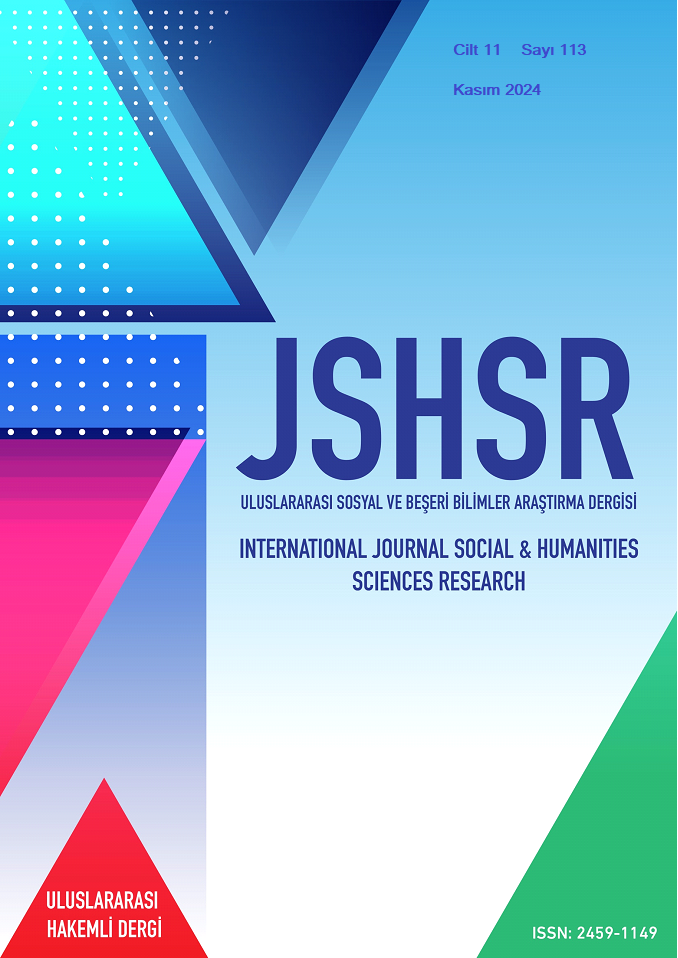Effects of Opera Students' Music Listening Habits on the Vocal Training Process
DOI:
https://doi.org/10.5281/zenodo.14260313Keywords:
Vocal Training, Opera, Classical Music, Music ListeningAbstract
Opera is a rich and multi-layered art form that combines music, drama, and visual arts. This multi-layered structure shapes the skills that opera performers are required to possess. Therefore, for an opera performer to succeed, having merely a good vocal technique is not sufficient; they must also develop their musical expressiveness and acting skills. The training provided in the opera departments of conservatories aims to instill and enhance these abilities. In this context, the study aims to examine opera students' music listening habits and the impact of these habits on their vocal training processes from the perspective of the students. A survey model was adopted in the study, and data were collected from 18 students studying in the opera department of a conservatory in Turkey through a questionnaire method. The study group consisted of opera students from various grade levels. Data were gathered via a structured questionnaire and analyzed using frequency distributions. The findings indicate that students who regularly and consciously listen to classical music and opera are more successful in improving their vocal techniques and enriching their musical expressiveness. The study highlights the significant role of music listening habits in vocal training and recommends incorporating more practices to enhance the classical music listening skills of opera students. The findings suggest that similar studies should be conducted in the opera departments of other conservatories in Turkey. Accordingly, it is anticipated that broader data will contribute to developing new approaches to enrich the vocal training process.
References
Anyanwu, G. E., Nto, J. N., Agu, A. U., Ekezie, J., & Esom, E. A. (2016). Musical preferences and learning outcome of medical students in cadaver dissection laboratory: A Nigerian survey. Annals of Anatomy, 208, 228-233. https://doi.org/10.1016/j.aanat.2016.07.010
Bolander, H.B., & Callahan, S. (2021). Rockin’ the GRE: The Effects of Preferred, Non-preferred, and Classical Music on College Students’ Cognitive Test Performance. Butler Journal of Undergraduate Research, 7 (9), 115-128.
Bozkır, B. (2009). Profesyonel müzisyenlerde müzik algısı farklılıkları: Bir fMRI çalışması [Yayımlanmamış Doktora Tezi]. Dokuz Eylül Üniversitesi.
Cabanac, A., Perlovsky, L., Bonniot-Cabanac, M., & Cabanac, M. (2013). Music and academic performance. Behavioural Brain Research, 256, 257-260. https://doi.org/10.1016/j.bbr.2013.08.023
Fisher, B.D. (2005). A History of Opera: Milestones and Metamorphoses. Opera Journeys Publishing, US.
Garcia, M. (1894). Hints on Singing. (Çev. Beata Garcia). Ascherberg & Co., London.
Haldane, C.R. (2018). Balancing Performing and Teaching Roles: The Voice of Classical Singers. Frontiers in Psychology, 9 (2503), 1-11. https://doi.org/10.3389/fpsyg.2018.02503
Hyry-Beihammer, E.K. (2010). Master-Apprentice Relation in Music Teaching From a Secret Garden to a Transparent Modelling. Nordic Research in Music Education, 12, 161-178.
İlyasoğlu, E. (2008). Zaman İçinde Müzik. Remzi Kitabevi.
Jiang, J., Rickson, D., & Jiang, C. (2016). The Mechanism of Music for Reducing Psychological Stress: Music Preference as a Mediator. The Arts in Psychotherapy, 48, 62–68.
Karatay, S. (2022). Çevrimiçi dinleme pratiklerinin kullanıcı ve sektör açısından eleştirel analizi: Spotify örneği [Yayımlanmamış Doktora Tezi]. Marmara Üniversitesi.
Kelly, A.P. (2023). Teaching Artist? Re-considerations. Arts Education Policy Review, 124 (4), 221-227. https://doi.org/10.1080/10632913.2022.2042445
Kuyucu, M. (2020). Bir Müzik Mecrası Olarak Radyonun Üniversite Öğrencilerinin Müzik Tüketim Alışkanlıklarına Olan Etkisi. Kesit Akademi Dergisi, 6 (23), 245-265.
Mancini, G. (1912). Practical Reflections on the Figurative Art of Singing. (Çev. Pietro Buzzi). The Gorham Press, Boston.
Muslimah, M., & Apriani, W. (2020). The effect of listening to music on concentration and academic performance of the students: Cross-sectional on English education college students. FKIP Universitas Lambung Mangkurat Banjarmasin, 3 (1), 27-32.
Özdemir, E., & Coşkuner, S. (2018). Müzik dinleme etkinliklerinin ilköğretim öğrencilerinin akademik başarısına etkisi. İlköğretim Online, 17 (1), 57-69. https://doi.org/10.17051/ilkonline.2018.413741
Sakar, M.H., & Maba, A. (2015). Ortaokul Öğrencilerinin Müziksel Tercihleri ve Dinleme Pratikleri. Uluslarası Sosyal Araştırmalar Dergisi, 8 (36), 980-996.
Sevginer, N. (2019). Popüler kültür, müzik ve toplumsal farklılaşma: Eskişehir’deki senfonik müzik dinleyicileri üzerine bir araştırma [Yayımlanmamış Yüksek Lisans Tezi]. Anadolu Üniversitesi.
Sönmez, V. ve Alacapınar, F.G. (2014). Örneklendirilmiş Bilimsel Araştırma Yöntemleri. Anı Yayıncılık, Ankara.
Stark, J. (1999). Bel Canto: A History of Vocal Pedagogy. University of Toronto Press, Toronto.
Şenoğlu Özdemir, C. (2019). Analitik müzik dinleme etkinliklerinin müzikal bilgi, algı ve performans başarısına etkisi [Yayımlanmamış Doktora Tezi]. Marmara Üniversitesi.
Downloads
Published
How to Cite
Issue
Section
License
Copyright (c) 2024 INTERNATIONAL JOURNAL OF SOCIAL HUMANITIES SCIENCES RESEARCH

This work is licensed under a Creative Commons Attribution 4.0 International License.


